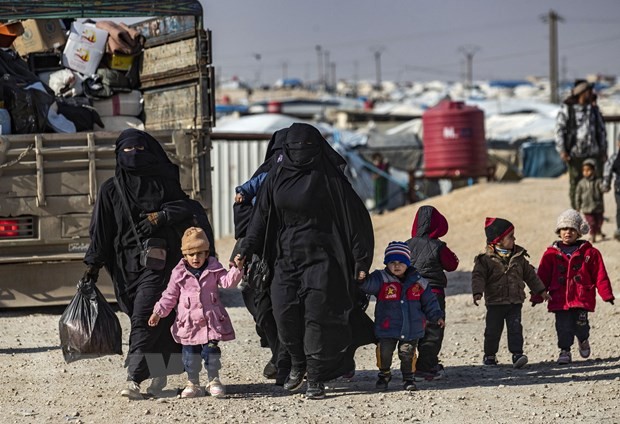
Viet Nam calls for more support to victims of sexual violence in conflict
Latest
 |
| Women and children are seen in the al-Hol camp in Syria's Hasakeh province on January 28, 2021. (Photo: AFP/VNA) |
The victims should be assisted to access psychological, medical, training and legal services, integrate into the community and seek livelihood sources, Quy said while chairing an open debate of the UN Security Council (UNSC) on women, peace and security on April 14.
The virtual debate is one of the initiatives raised by Vietnam in its capacity as President of the UNSC in April.
Quy expressed his concern over sexual violence in conflict as well as its impact on victims, particularly women and children, emphasising the need to take a comprehensive approach to the problem.
Such an approach should not only include timely assistance for victims but also measures to address the root causes of sexual violence in conflict, he said.
Preventing such violence also requires the full and equal participation of women in decision-making and peace processes, Quy went on.
While states bear the primary responsibility to address sexual violence, the international community, and the UN system, in particular, can provide much-needed development assistance, capacity-building, technical support and training, he said.
In that regard, he called for sexual violence prevention and response to be incorporated in peacekeeping mandates and for more women to be deployed in peacekeeping missions to work closely among communities on the ground.
Addressing the meeting, Pramila Patten, Special Representative on Sexual Violence in Conflict, said there were over 2,500 UN-verified cases of conflict-related sexual violence in 18 countries last year alone.
The COVID-19 pandemic has given rise to new gender-based protection concerns, the Special Representative said.
She affirmed that now was the time to “take stock of both the persistent and entrenched, as well as new and emerging, challenges…to eradicate the scourge”.
“Prevention is the best and only cure” to stem the multiple, devastating and enduring consequences faced by survivors of sexual violence in conflict, especially as a brutal tactic of war.
Nobel Peace Prize Laureate Denis Mukwege said humanity should feel a collective sense of shame, for doing so little to draw a “red line” against those who commit “odious” crimes of sexual violence.
And while some progress has been made in international law surrounding sexual violence in war, abuses remain far too frequent and responses dramatically under-funded.
Meanwhile, Caroline Atim, Director of South Sudan Women with Disabilities Network, highlighted the prevalence of sexual violence as a tool of subjugation and control, including for victims who are forced to marry their abusers.
She also spoke of the specific needs and vulnerabilities of women with disabilities and the importance of “non-discriminatory” services for victims, including psychological services.
Other UNSC member countries thanked Vietnam for promoting dialogues on a humanitarian and urgent issue and affirmed their commitments to preventing and putting an end to sexual violence in conflict.












